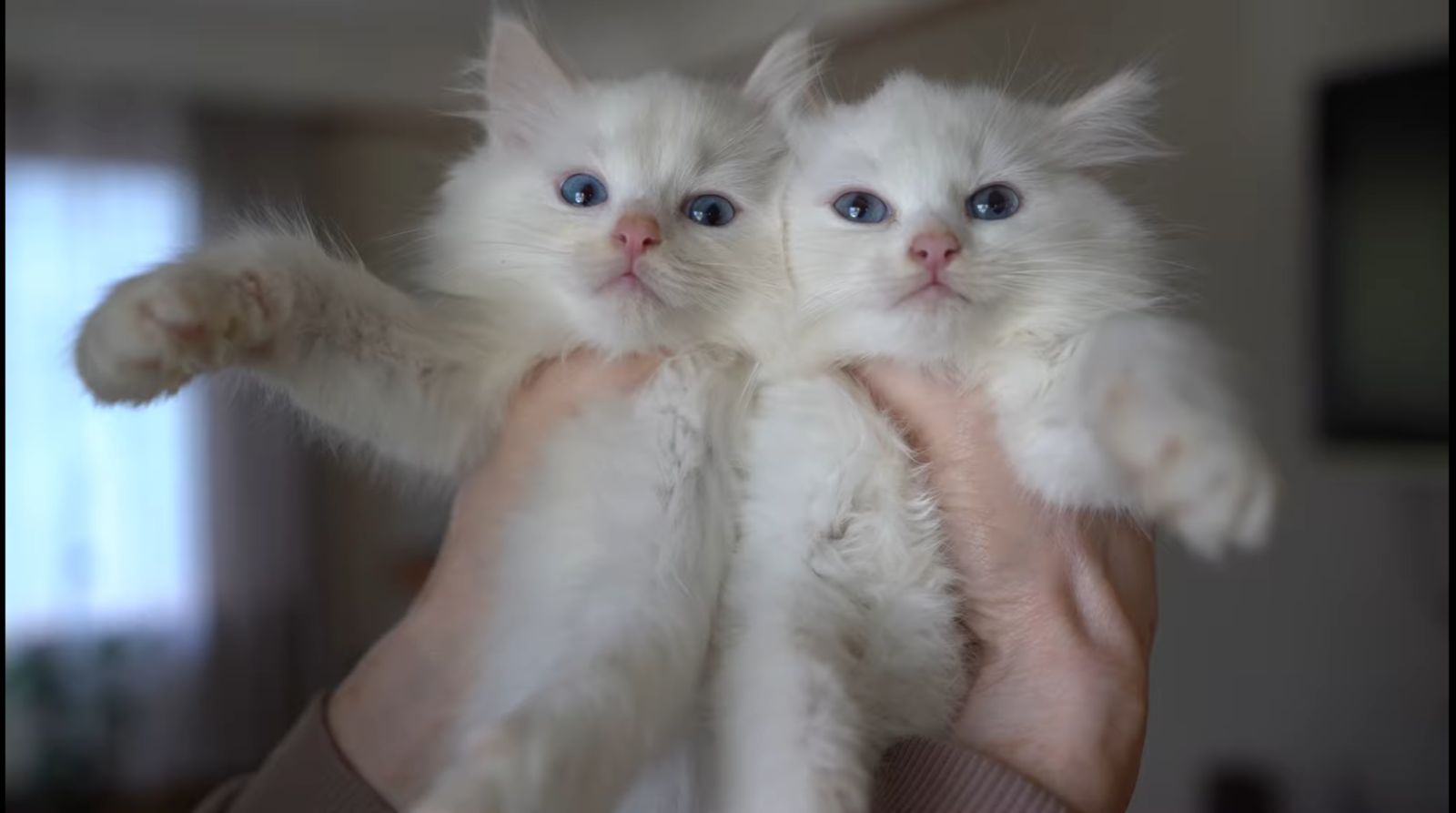Cat Dental Care Products
Cat dental care products, like specially designed toothbrushes and toothpaste, are essential for maintaining your feline friend’s oral health. Regular use of these products helps prevent dental issues such as plaque and tartar buildup, gum disease, and bad breath in cats. Dental treats and toys can also aid in keeping your cat’s teeth clean and promoting healthy gums, making them an excellent addition to their routine.
Cat tooth cleaning toys are designed to help maintain your cat’s dental health by promoting dental hygiene while they play. These toys typically have textured surfaces or features that help clean your cat’s teeth and massage their gums as they chew or play with them.
Here are some common types of cat tooth-cleaning toys:
- Dental Chew Toys: These toys are often made of rubber or durable plastic and have textured surfaces to help remove plaque and tartar from your cat’s teeth as they chew on them.
- Interactive Treat Dispensers: Some treat-dispensing toys are designed to hold dental treats or kibble. As your cat plays with the toy, treats are dispensed, and the act of getting the treats out can help clean their teeth.
- Dental Balls: These are usually rubber balls with nubs or ridges that can help clean your cat’s teeth as they bat them around.
- Dental Sticks: Dental sticks for cats are like small chew sticks with ridges or grooves. Cats can gnaw on them, and the texture helps remove debris from their teeth.
- Catnip Dental Toys: Many cat dental toys contain catnip to entice your cat to play with them. This can make the process of cleaning their teeth more enjoyable for your cat.
- Cat Toothbrush Toys: These toys are specially designed to hold cat toothpaste, and your cat can chew on them, helping to distribute the toothpaste across their teeth and gums as they play.
- Fish-Shaped Toys: Some dental toys are shaped like fish with ridges or bristles designed to clean your cat’s teeth and gums.
It’s important to choose dental toys that are safe for your cat and made from non-toxic materials. Additionally, always supervise your cat while they play with these toys, and make sure to clean them regularly to prevent the buildup of bacteria or debris.
While dental toys can be a helpful part of your cat’s dental care routine, they should not replace regular dental check-ups with your veterinarian and a comprehensive dental care plan. If you’re concerned about your cat’s dental health, consult with your vet for guidance on the best approach to maintaining their oral hygiene.
2. Cat mouth spray:
Cat mouth spray, also known as cat dental spray, is a product designed to help improve the oral hygiene of cats. It is used to address common feline dental issues such as plaque buildup, tartar, bad breath, and gum disease. The spray typically contains ingredients that can help reduce bacteria in the mouth and promote better oral health for your cat.
Here’s how cat mouth spray typically works:
- Ingredients: Cat dental sprays often contain antibacterial agents, enzymes, and other ingredients that help to break down plaque and tartar on your cat’s teeth.
- Usage: You spray the product directly into your cat’s mouth, or you can sometimes spray it onto their food. Follow the specific instructions on the product label for the correct dosage and application method.
- Benefits: Regular use of dental spray can help reduce the formation of plaque and tartar, which can lead to gum disease and tooth decay. It can also help freshen your cat’s breath.
- Reduces Bad Breath: One of the most common reasons cat owners use mouth sprays is to combat bad breath in their feline companions. These sprays often contain ingredients that help neutralize odors and freshen the cat’s breath.
- Prevents Plaque and Tartar: Some dental sprays contain enzymes or antibacterial agents that can help prevent the buildup of plaque and tartar on a cat’s teeth. Regular use can lead to improved oral hygiene.
- Reduces Risk of Gum Disease: By controlling plaque and tartar, dental sprays can lower the risk of gum disease in cats. Gum disease, if left untreated, can lead to tooth loss and other health issues.
- Helps with Oral Health Maintenance: For cats that refuse to tolerate tooth brushing, dental sprays provide an alternative method for maintaining oral health. They are easy to administer and less stressful for some cats.
- Convenience: Dental sprays are convenient to use, especially for cat owners who find it challenging to brush their cat’s teeth. A few spritzes can be quicker and less intimidating for both the cat and the owner.
- Prevents Systemic Health Issues: Dental problems in cats can lead to systemic health issues when bacteria from the mouth enter the bloodstream. Using a dental spray may help prevent these secondary health problems.
- Supplemental Care: While not a replacement for regular professional dental care, dental sprays can be used as a supplemental measure to maintain oral hygiene between veterinary check-ups and cleanings.
- Promotes a Comfortable Mouth: Dental sprays with soothing ingredients can help alleviate discomfort or irritation in a cat’s mouth due to dental issues.
It’s important to note that the effectiveness of cat mouth sprays can vary depending on the product and the cat’s individual needs. Additionally, they are generally most effective when used as part of a comprehensive oral care routine that includes regular veterinary dental check-ups and, if possible, tooth brushing. Always consult with your veterinarian before introducing any new oral care product to your cat’s routine to ensure it’s appropriate for your cat’s specific needs.
- Consult Your Vet: Before using any dental product on your cat, it’s a good idea to consult with your veterinarian. They can guide the best products for your cat’s specific dental needs and offer advice on how to incorporate dental care into your pet’s routine.
It’s important to note that while dental sprays can be a helpful part of a cat’s oral care routine, they should not replace regular dental check-ups and cleanings by a veterinarian. Dental issues in cats can lead to serious health problems if left untreated, so it’s crucial to maintain good oral hygiene and seek professional dental care when needed.
Always choose products specifically formulated for cats and consult with your vet if you have concerns about your cat’s oral health or if you’re unsure about which dental care products to use.
3. Cat dental wipes:
Cat dental wipes are a type of pet care product designed to help maintain your cat’s oral hygiene. These wipes are typically made of soft and textured materials that are safe for cats and can be used to clean their teeth and gums. They are usually pre-moistened with a cat-friendly solution that helps remove plaque and food debris from your cat’s mouth.
Here’s how to use cat dental wipes:
- Gently hold your cat’s head and lift their lips to expose their teeth and gums.
- Take a dental wipe and use it to wipe the surface of your cat’s teeth and gums. Be gentle to avoid causing any discomfort.
- You can use a different part of the wipe for each tooth or area to prevent the spread of bacteria.
- Pay extra attention to the back teeth, as these are often more prone to plaque buildup.
- Dispose of the used dental wipe properly.
Regular use of dental wipes can help reduce plaque and tartar buildup, prevent bad breath, and contribute to your cat’s overall oral health. However, they are not a substitute for professional dental care. If your cat has severe dental issues or persistent bad breath, it’s essential to consult your veterinarian for a comprehensive dental examination and appropriate treatment. Additionally, some cats may not tolerate having their teeth cleaned with wipes, so it’s essential to be patient and gentle during the process.
4. Cat dental water additive:
Water Additives: Some products can be added to your cat’s water to help reduce plaque and tartar buildup. These are typically referred to as “dental water additives.” They often contain enzymes or chemicals that help break down plaque.
Please note that while dental water additives may be a part of your cat’s dental care routine, they should not be used as a sole means of dental care. Regular brushing and professional veterinary care are essential for maintaining your cat’s dental health.
If you meant something different by “cat dental water,” please provide more context or specify your question, and I’ll be happy to assist you further.
5. Cat dental treats and chews:
Promoting dental health in cats is essential to prevent dental problems such as plaque buildup, tartar, and gum disease. One way to support their oral hygiene is by providing dental treats and chews designed specifically for cats. These treats can help reduce plaque and tartar, freshen its breath, and provide some enjoyment for your feline friend.
Here are some options:
Dental Treats: These are designed to be crunchy, which can help scrape away plaque as your cat chews. Look for treats that are specifically formulated for dental health. Brands like Greenies and Feline Greenies are popular choices.
Dental Chews: Dental chews are typically more substantial than regular treats, requiring your cat to chew them more thoroughly. Some have a textured surface to help clean teeth while being chewed. Examples include Virbac C.E.T. VeggieDent Chews and Purina DentaLife Dental Cat Treats.
Dental Toys: While not treats or chews in the traditional sense, dental toys can encourage cats to play and chew, promoting dental health. Toys with textured surfaces or bristles can help clean teeth. Look for toys made of safe, non-toxic materials.
Prescription Dental Diets: Your veterinarian may recommend a prescription dental diet that is formulated to promote oral health. These diets often have larger kibbles designed to encourage chewing and reduce plaque buildup.
When choosing dental treats and chews for your cat, consider the following factors:
Size: Ensure that the treats or chews are an appropriate size for your cat’s age and breed.
Ingredients: Check the ingredients list to make sure the treats are made from high-quality, easily digestible ingredients. Avoid treats with excessive fillers and artificial additives.
Texture: Look for treats with a crunchy or abrasive texture to help clean teeth.
Flavor: Cats can be picky, so try to find treats with flavors your cat enjoys.
Veterinary Guidance: It’s a good idea to consult with your veterinarian before introducing any new treats or chews into your cat’s diet, especially if your cat has pre-existing dental issues or dietary sensitivities.
Remember that dental treats and chews should complement regular dental care, which includes brushing your cat’s teeth if possible and scheduling regular dental check-ups with your veterinarian. Dental health is crucial for your cat’s overall well-being, so investing in their oral hygiene is a wise choice.




